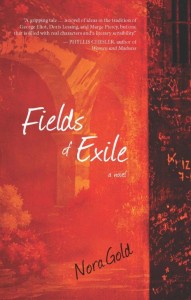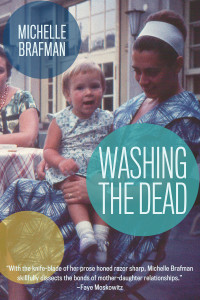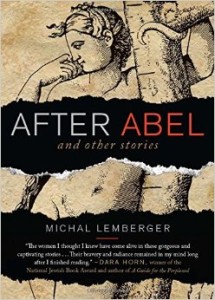Yona Zeldis McDonough
New Fiction from Three Lilith Authors
Short stories by each of these three have appeared in Lilith.
 Fields of Exile by Nora Gold (Dundurn, $24.99) tells the story of Judith, a 32-year-old Canadian who returns home from the life she has made for herself in Israel in order to care for her ailing father. When he dies, she is eager to go back. But he had begged her before his death to go back to graduate school, so she enrolls in a local social work program. Within this seemingly safe academic oasis, Judith’s world is rocked. In Israel, she had been a peace activist, and identified with left-wing politics there. But her new intellectual community is openly hostile to Israel, and suddenly everything she cherishes is threatened when she learns that the keynote speaker for Anti-Oppression Day supports attacks not only on Israeli military targets, but also on Israeli civilians and on Jews worldwide.
Fields of Exile by Nora Gold (Dundurn, $24.99) tells the story of Judith, a 32-year-old Canadian who returns home from the life she has made for herself in Israel in order to care for her ailing father. When he dies, she is eager to go back. But he had begged her before his death to go back to graduate school, so she enrolls in a local social work program. Within this seemingly safe academic oasis, Judith’s world is rocked. In Israel, she had been a peace activist, and identified with left-wing politics there. But her new intellectual community is openly hostile to Israel, and suddenly everything she cherishes is threatened when she learns that the keynote speaker for Anti-Oppression Day supports attacks not only on Israeli military targets, but also on Israeli civilians and on Jews worldwide.
Gold’s willingness to grapple with subtle, intellectual forms of anti-Semitism could not be timelier or more important, and her dissection of the problem is both nuanced and astute. Yet this is not a novel-of-ideas, but one grounded in entirely believable interpersonal relationships and complex threads of human feeling. After hearing a particularly upsetting comment in her Introduction to Social Justice class, Judith is unable to speak the truth raging in her heart:
“Greg is still talking but she can’t hear him anymore. She is feeling herself disappear…. She is not real now, she’s just a shell. But no, there is one thing left inside her: a wind. A wind blowing around and around, forming itself into a tornado. A tornado that is a scream. And in the middle of the scream, there is only one word. Israel.”
By the close of this provocative, insightful novel, we, like Judith, come to understand how vast the scope of exile can truly be.
 Much of the debut novel from Michelle Brafman, Washing the Dead (Prospect Park Books, $16), plays out on a smaller stage — a tightly knit Orthodox community in Milwaukee — but her eye is no less acute than Gold’s. In a story that shuttles back and forth between 1973 and 2009, she trains her gaze on Barbara Blumfeld, a suburban mom and preschool teacher who was 17 when her own mother’s passionate involvement with the local shabbos goy tore her world apart. But the affair began long before that:
Much of the debut novel from Michelle Brafman, Washing the Dead (Prospect Park Books, $16), plays out on a smaller stage — a tightly knit Orthodox community in Milwaukee — but her eye is no less acute than Gold’s. In a story that shuttles back and forth between 1973 and 2009, she trains her gaze on Barbara Blumfeld, a suburban mom and preschool teacher who was 17 when her own mother’s passionate involvement with the local shabbos goy tore her world apart. But the affair began long before that:
“I am six years old, and I am sitting across the table from my mother, eating my after - school snack and watching her smoke. I spread peanut butter on my apple with a paring knife, wondering why she hasn’t noticed that I’m using it or that I’ve lost my front tooth. She is looking through me. We’re sitting so close that I can see her eyelashes, thicker than my doll Cassandra’s, but she cannot see me. This is the first disappearance that I remember, but now I know that her leaving was gradual, an accretion of tiny moments that led to her affair and her slow exit from our lives.”
Shunned by the community for her mother’s transgression, Barbara forges an entirely different life for herself. But years later, when the rebbetzin from her childhood asks her to come back to help perform the ritual burial washing of a beloved teacher, she’s pulled back to that tumultuous time. She can either ignore the summons or find the strength to confront the past, reach out to her estranged mother, and redirect the course of her own family’s future. How she goes about it is the substance of this beautifully wrought novel, one in which Brafman examines the inner lives of her characters with the dexterity of a surgeon and the compassion of a saint.
 Calling the biblically themed stories in the new collection by Michal Lemberger midrashim is like calling champagne a carbonated beverage. The nine stories in After Abel (Prospect Park Books, $16) pulse with the rhythms of ancient life, infusing into these tales a kind of immediacy so bracing as at times to be shocking. How Lemberger, an academic who teaches the Bible as Literature course at the American Jewish University in Los Angeles, does this, is its own kind of miracle. In disarmingly simple yet powerful prose, she limns the lives of these Bible women, and we come to understand them — even love them — in new ways. Here is Eve, meditating on her post-Eden life:
Calling the biblically themed stories in the new collection by Michal Lemberger midrashim is like calling champagne a carbonated beverage. The nine stories in After Abel (Prospect Park Books, $16) pulse with the rhythms of ancient life, infusing into these tales a kind of immediacy so bracing as at times to be shocking. How Lemberger, an academic who teaches the Bible as Literature course at the American Jewish University in Los Angeles, does this, is its own kind of miracle. In disarmingly simple yet powerful prose, she limns the lives of these Bible women, and we come to understand them — even love them — in new ways. Here is Eve, meditating on her post-Eden life:
“After we fled the Garden, wrapped in the skins God had covered us with, we found out what cold was and clung to one another. But the warmth between our bodies made Adam’s clothes bulge and his breath quicken. His weight on me, the rocking of his body into mine, made me crave more. Dark came so early in those days. Nights I spent cataloguing every part of him, naming and touching — shoulder, elbow, nipple, stomach, shaft, scrotum. Each a new discovery, a new source of delight.”
Finally, Eve gets credit for naming — at least some body parts. And there’s much more, compactly told in this title story. She mourns the death of her son Abel, and though she has seen animals die, this is, movingly, her first understanding of human mortality.
The story in this collection about Lot’s wife (who gets her own name in this telling) originally appeared in Lilith. The others are all new, and each a gem.
Yona Zeldis McDonough’s sixth novel, You Were Meant for Me, was published by New American Library in 2014. She is Lilith’s fiction editor.
 Please wait...
Please wait...